Macron's popularity is in free fall after raising France's retirement age, analysts say
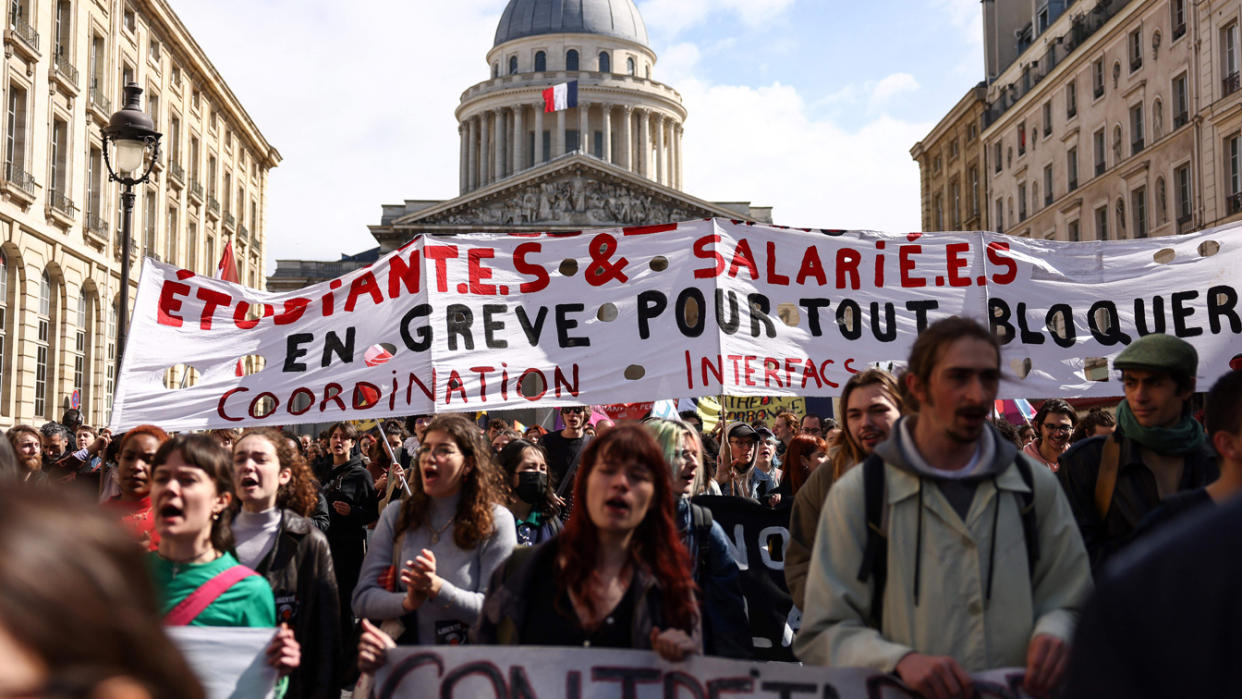
Growing frustration over French President Emmanuel Macron’s newly passed pension reform law, which has sparked two weeks of angry protests, have benefitted his political opponents and called into question whether he can remain in power, analysts say.
“There’s something different about these protests,” Joseph de Weck, a fellow in the European Security Initiative at the Foreign Policy Research Institute, told Yahoo News. “A trust in the president has been broken and there’s a feeling that the government does whatever it wants, disregarding completely the will of the majority of the French, 70% of whom don’t want this reform. So Macron doesn’t have a democratic mandate for doing what he’s doing.”
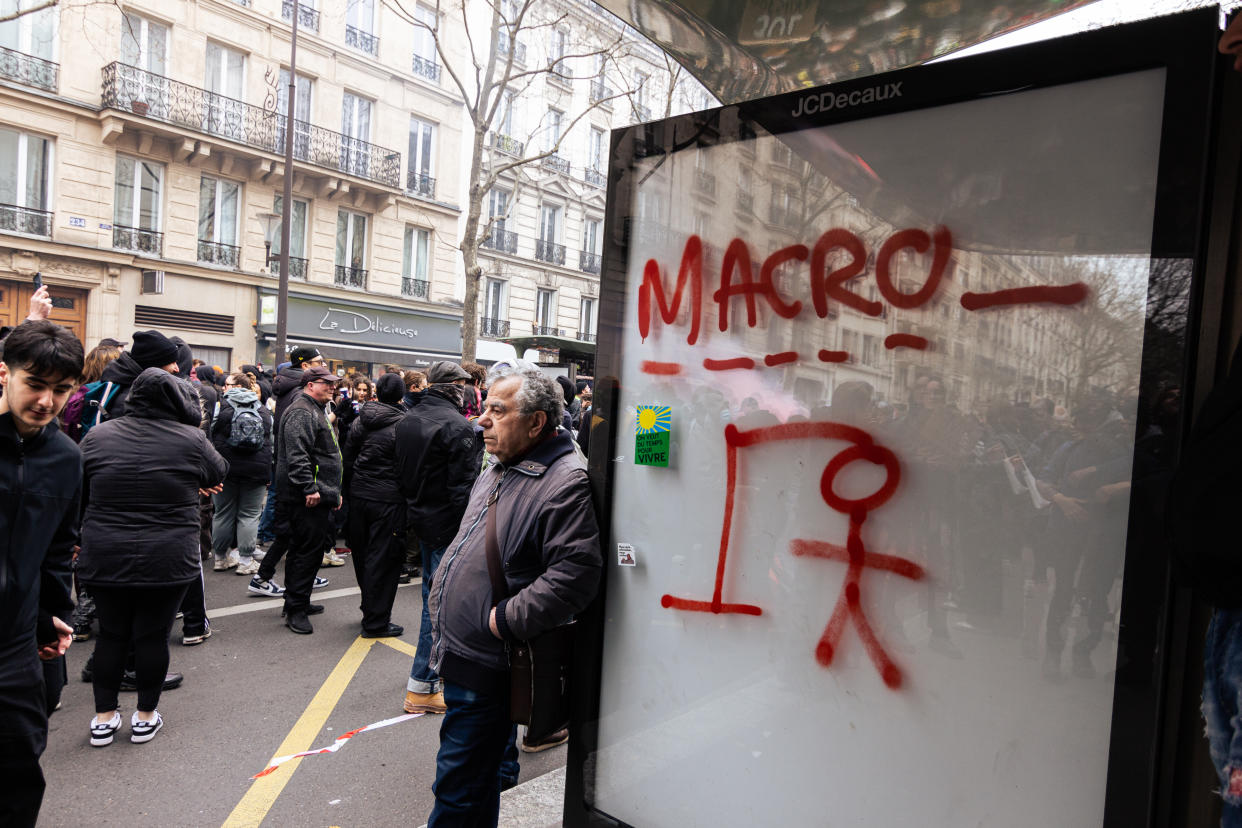
The new legislation, which Macron rammed through the National Assembly earlier this month without a full vote of its members, raised the retirement age from 62 to 64. While Macron insisted that the change was fiscally necessary in order for France to provide services to its aging population, it has resulted in a fiery public outcry.
“Sentiments are moving from discontent to anger,” political analyst Jean-Christophe Gallien, a columnist for France TV, told Yahoo News. “The country is not only opposing pension reform, it’s opposing Macron’s way of governing.”
Even unions that had previously allied with Macron, have aligned with each other in calling strikes to protest the reforms, and increasingly, Macron himself.

Political communications expert Philippe Moreau Chevrolet told Yahoo News that “the problem now is not about reforms or the economy. It’s about democracy.” The majority of the French, he said, “feel that Macron went too far and abused his power.” He likened the French presidency to a “political monster,” saying that the executive seat “has gained so much power over the years, while the Parliament is weak, that we don't have any checks and balances anymore.”
Weekly demonstrations against boosting the retirement age started in January, but on March 16, when Macron’s Prime Minister Élisabeth Borne used Article 49.3 to push through the pension law without requiring the lower house of Parliament to vote or debate it, fury erupted.
“Immediately in the streets of Paris, and across France, young people came out to say they were not OK with that,” Gallien said.
The invocation of Article 49.3 also triggered two no-confidence votes in the lower house of Parliament on March 20, with Macron’s government surviving by a mere nine votes.
With placards referring to “King Macron,” showing the president styled as Louis XVI, along with graffiti calling for his decapitation in Place de la Concorde, where Louis met the guillotine in 1793, the belief that Macron is acting like an autocrat is hitting new highs, said British-born French historian Andrew Hussey. “Some are even starting to use the ‘R-word’ — revolution,” Hussey told Yahoo News.
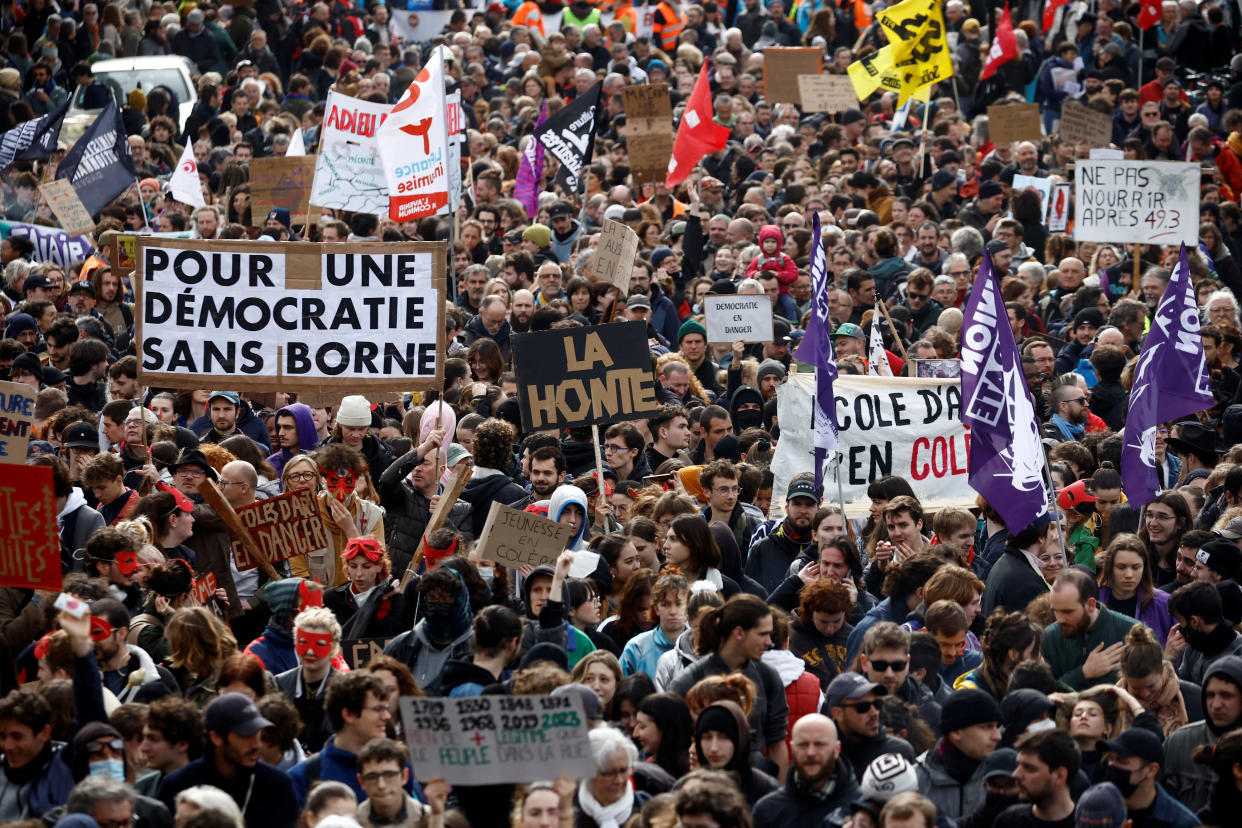
“Macron’s popularity is in free fall, it’s downward-spiraling,” Moreau Chevrolet said, noting the president’s approval rating dropped from 42% a year ago to 28% recorded earlier this month. “Even his supporters are turning against him.” While Macron regained confidence during his first term, when the Yellow Jacket protests forced him to drop a planned fuel tax, Moreau Chevrolet doesn’t see any easy way out this time, describing the current upheaval as a “historical political crisis that was provoked by the president unnecessarily.”
Moreau Chevrolet noted that Macron’s advisers cautioned against taking on pension reform during a period of inflation and increased costs of living, when the economy is just coming back from COVID. “His own experts said this reform was untimely, that it was not necessary right now, it’s not the right plan and not the right time,” he said.
Opponents of the pension reform law are now hoping the Constitutional Court, which is required to give final approval on legislation, will either dismiss or weaken it. “If the Constitutional Court cancels this law, the resolution to the crisis will come from the democratic system itself,” Moreau Chevrolet said.
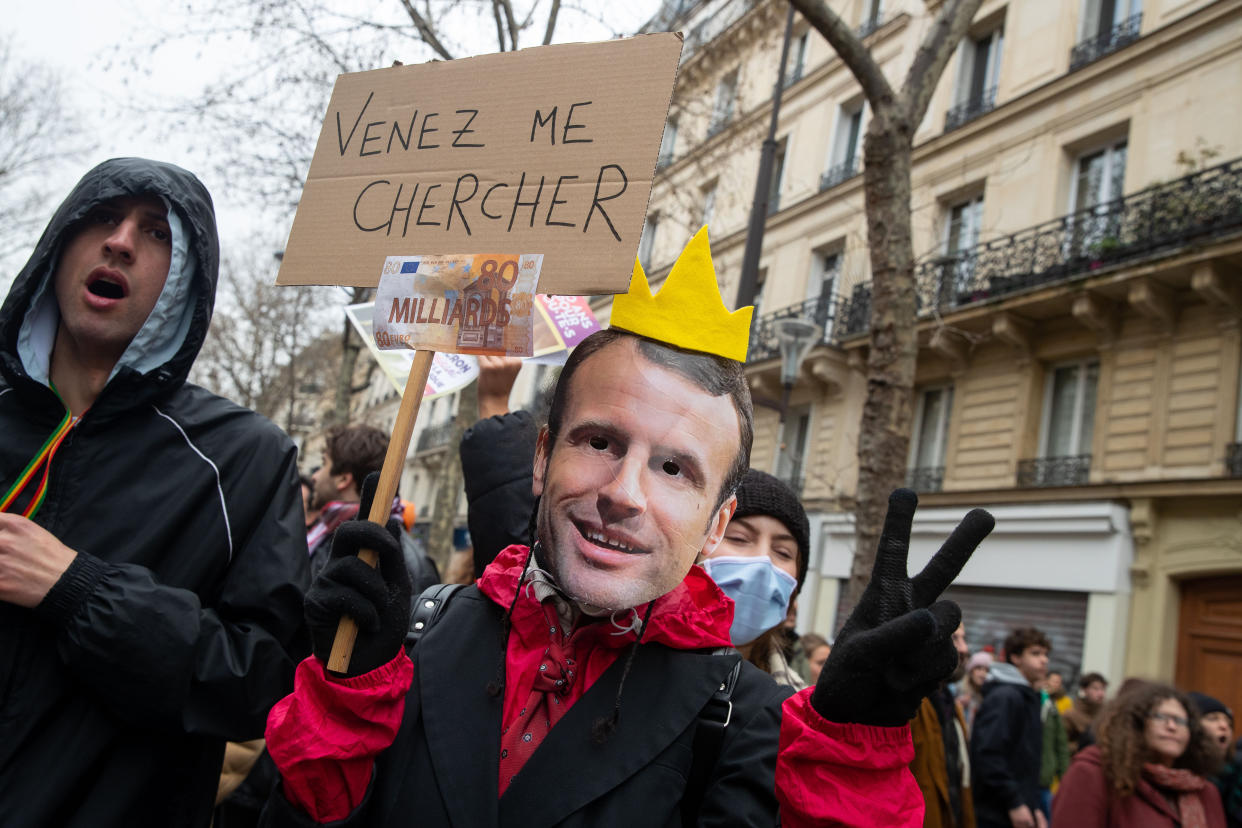
“Some aspects of the law may be struck down by the Constitutional Council,” Paul Smith, a professor of French politics at the University of Nottingham, told Yahoo News, pointing to the possibility, for instance, of not raising retirement ages for those working in physically demanding jobs. “But that decision won't come down until mid-April,” he added.
While most of Europe has already begun gradually raising their retirement age, the French have proven particularly resistant to any more changes.
“In the 1980s, President Mitterand told the French they could retire at 60, but that’s been nibbled away at,” Smith said. In 2010, it was boosted to 62. “Then Macron comes into government and says there’s a big gap in funding for the pension scheme. But he’s gone about it in a ham-fisted way,” he said, adding that young people are particularly motivated to join the mass protests. “They’re thinking, ‘You’re moving the goalposts for my parents. Where will the goalposts be when I retire?’”
In recent days, the ire at Macron has turned increasingly violent. Garbage blazes at protests are now common, and demonstrators have shut down access to the Louvre, the Eiffel Tower and Charles de Gaulle Airport. Last week, they set fire to Bordeaux City Hall.
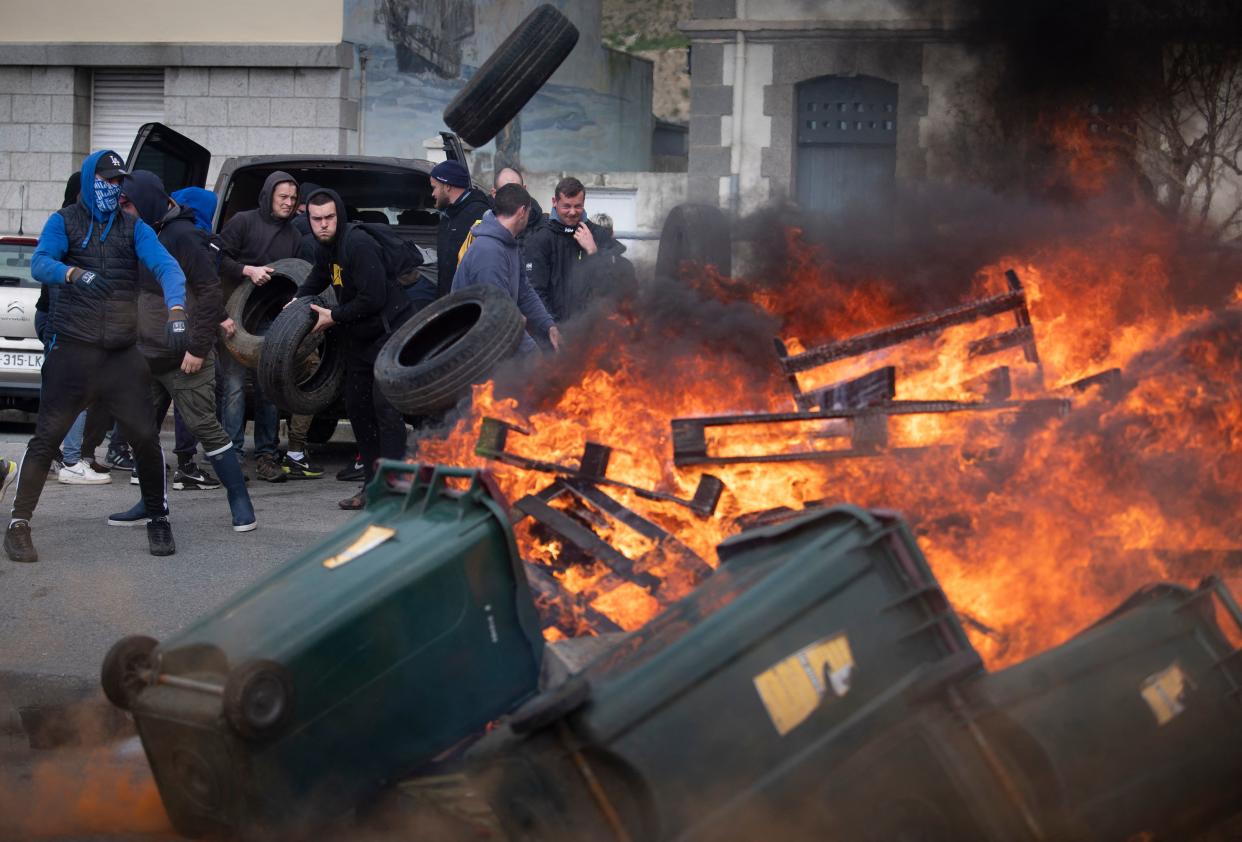
“There’s got to be a tipping point where Macron resigns — when he looks at this country falling apart and the anger drives him out,” Hussey said.
Others, however, believe that Macron will remain in power, but as a lame duck whose political capital is spent. “Politically, I think his mandate is over,” said Moreau Chevrolet.
A prevalent fear among analysts, however, is how this ordeal is empowering extremist political parties in the country. Far-left politician Jean-Luc Mélenchon of France Unbowed, who came in third in the first round of presidential elections last year, has been partaking in demonstrations, calling for “a battle” to stop the pension law. Far-right politician Marine Le Pen, who lost the presidency to Macron last April, has so far stayed largely on the sidelines while expressing her disdain for both the pension reform and at Macron’s role in causing the mayhem.
“Consciously, the government is creating all the conditions for a social explosion, and it was foreseeable for months, as if they were looking for that,” she told AFP earlier this month.
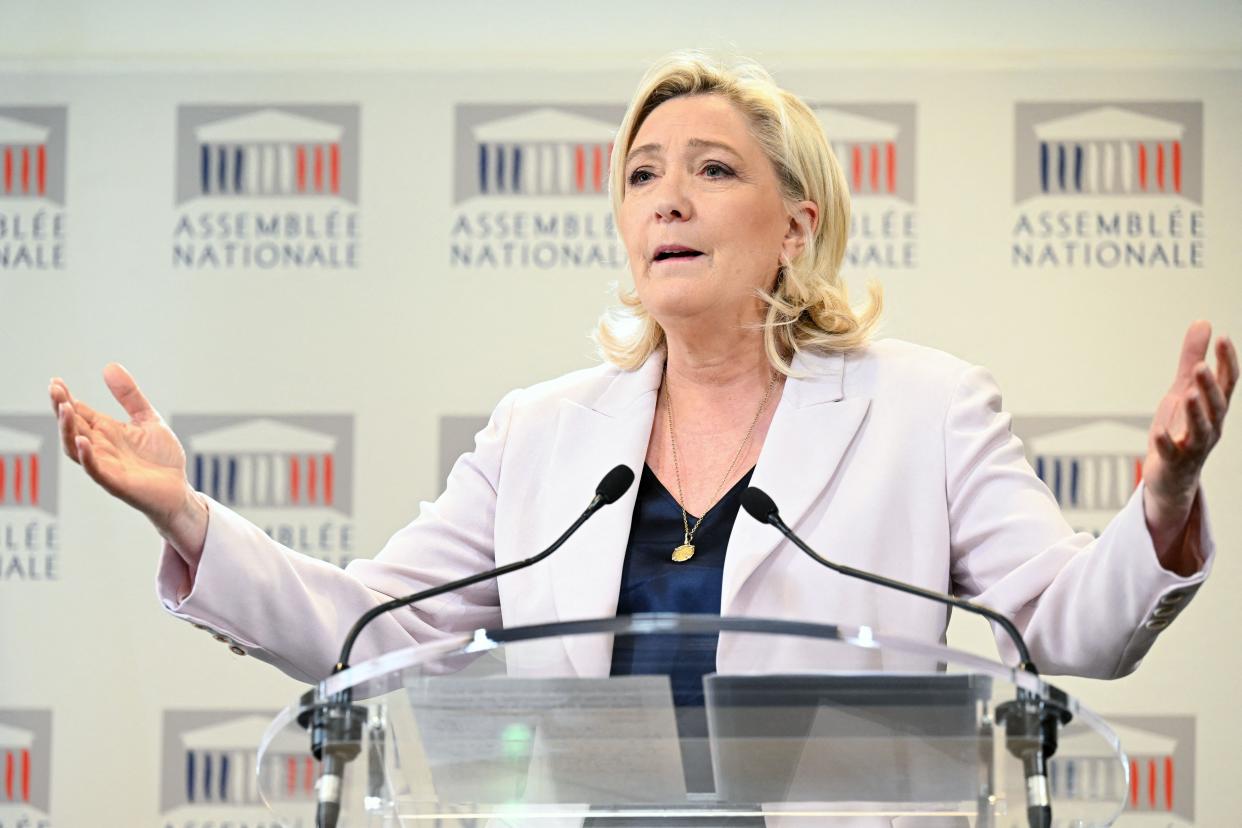
Analysts worry that Macron’s pension maneuvering is driving voters straight into the arms of Le Pen and Mélenchon. “The only ones who can win from this are the far-right and the far-left,” said de Weck. “They’re the ones who are saying France is run by a political elite that is anti-democratic and has its own interests.”
According to an Ifop Group survey released last week, if parliamentary elections were held today, Le Pen’s party would win 26%, Mélenchon would take 26% and Macron would come in third at 22%.
Even though the next presidential election is not scheduled until 2027, de Weck is certain that “the French will remember” the pension battle.
In the shorter term, the real damage to France, which will host next year’s Olympic Games, may be in terms of its international image. Gallien was taken aback when the “government of Iran told Mr. Macron to respect the rights of people in the street,” — a reprimand that rang hypocritical to many, given Iran’s brutal repression of protesters.
“And what’s going to happen during the Olympics?” asked Smith. “If Macron can’t control the protesters enough for King Charles to come,” he noted, referring to a scheduled visit by the English king that Macron canceled last week, “what’s he going to do when it’s really in the international spotlight?”
For now, Macron is hoping that the anger over raising the retirement age will fade. On Thursday, he made an appearance in the French Alps to announce a new water conservation plan. But even there, he couldn’t escape the controversy that follows him wherever he goes.
“There is a social movement against a reform,” he told reporters. “But that doesn’t mean that everything else has to stop.”
